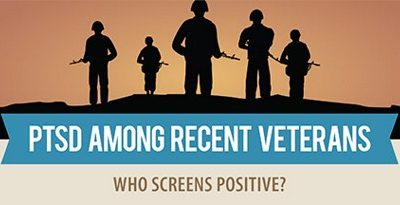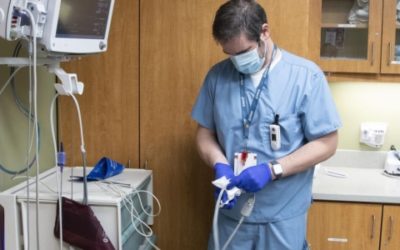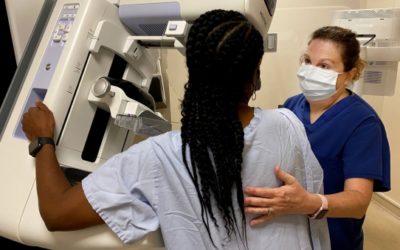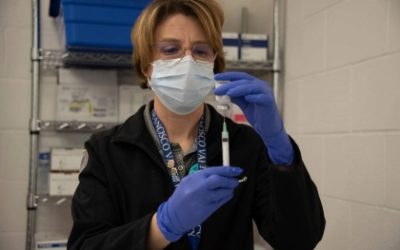Any interaction with the criminal justice system can be a frightening, confusing experience for those being charged. It can be especially difficult to navigate for men and women who are homeless or struggling with mental health or substance abuse issues.
VA Studies Continue to Demonstrate High COVID-19 Vaccine Effectiveness
From the time the COVID-19 mRNA vaccines became available in late 2020, VA studies have been crucial to understanding their effectiveness in real life.
Expanded Role for MTFs Could Improve Obstetric Care in Underserved U.S. Areas
If military treatment facilities offered emergency cesarean delivery and other high-quality obstetric care to civilians in underserved areas of the United States, according to a new study, it would not only significantly improve the health of expectant mothers and their babies but also potentially improve military readiness.
Repeat Lung-Cancer Screening Lags for Rural Veterans
Repeat lung cancer screening lags among rural veterans and could help explain known disparities in outcomes, according to a new study.
Military, Veterans More Likely to Get Most Cancer Screening
While cancer diagnoses are disproportionately high among VA patients, the cause does not appear to be inadequate screening, according to a new study.
What Are Associations Among Panic Attacks, PTSD and SUDs in Veterans?
Posttraumatic stress disorder (PTSD) has been estimated to affect 12.9% of U.S. veterans, compared to the lifetime risk of PTSD in the general population which is estimated at 6.8%.
Ann Arbor VAMC Rapidly Stands Up Monoclonal Antibody Treatment Service
As emergency departments around the country struggled to get through the day during the recurrent surges of the COVID-19 pandemic, the emergency medicine team at the LTC Charles S. Kettles VAMC here did something extraordinary—they sought out more patients to treat.
VHA Has Better Noncardiac Surgical Outcomes Than Private Sector Hospitals
Perioperative outcomes at the VHA are consistently better than those in private sector hospitals, according to a new study.
Gout Associated With Slightly Decreased Risk of Glaucoma
How does a history of gout or arthritis due to hyperuricemia affect the development of the ocular neurodegenerative condition glaucoma?
Who Receives Video Telemental Health Services at VA? It Depends.
Across specialties, the COVID-19 pandemic has prompted an unprecedented shift toward the use of telemedicine. At the same time, the pandemic has produced a surge in demand for mental health services, as depression and anxiety have dramatically increased.
Dry Eye Worse in Veterans With GWI
Veterans with Gulf War illness (GWI) have more severe dry eye (DE) symptoms, including neuropathic eye pain questionnaire scores, when compared to those who served during the Gulf War but did not meet criteria for GWI.
MHS Patients Have Higher Breast Cancer Survival Rates Than U.S. in General
Accessibility to healthcare is an important determinant in cancer survival. Studies of patients in the military health system (MHS), which provides universal care to uniformed servicemembers, military retirees and family members, have shown higher survival rates for several forms of cancer compared to the general U.S. population. A new study has added breast cancer to that list.
Smoking After Lung Cancer Surgery Cuts Survival
Continuing to smoke after surgical treatment for lung cancer has a strong detrimental effect on overall survival, according to a new veterans’ study.
Aqueous Biomarkers Might Reveal Who Will Benefit from Long-Term Therapy for Neovascular AMD
Age-related macular degeneration (AMD) is the leading cause of severe vision loss in individuals over the age of 50 years, which is especially significant for U.S. veterans. Male veterans had a median age of 65 in 2017, with female veterans somewhat younger at 51.
New Treatment Options Offer Brighter Future for Veterans with AMD
Veterans who develop age-related macular degeneration (AMD) now have a variety of treatments available that can preserve and even improve vision—and more are on the way. In wet AMD, the options are exploding, while VA research has also identified a possible treatment for dry AMD.
Time Is Vision: Earlier Diagnosis Is Critical in Age-Related Macular Degeneration
The last 20 years have brought dramatic changes to the treatment of age-related macular degeneration (AMD) and made early detection more important than ever.
Pandemic Increased Challenges for Veterans with AMD
For many veterans, receiving regular eye care poses a significant challenge even in ordinary years. COVID-19 made it more difficult still. While many veterans with age-related macular degeneration (AMD) missed some appointments and scheduled treatments early in the pandemic, the VA quickly adapted its clinic protocols and outreach to veterans who needed vision care.
VA Shows Commitment to Veterans with Age-Related Macular Degeneration
For nearly 80 years, the VA has supported veterans with low-vision or blindness. Today, the VA’s Office of Blind Rehabilitation estimates that about 130,000 veterans are legally blind and another million have vision impairments that interfere with their daily lives.
Conference Highlights Concerns About Increased CV Risk Factors in Veterans
New research is adding to the evidence that veterans are at increased risk for cardiometabolic conditions and poor cardiovascular outcomes.
Shingles Vaccination Rates Struggle to Improve at VA
Efforts to promote use of a vaccine against herpes zoster, commonly called shingles, have been fraught with difficulty.
How Deployed Military Personnel Viewed COVID-19 Vaccination
To better understand vaccine hesitancy related to COVID-19 shots, a study recently looked at how likely deployed military personnel is to be vaccinated.
Receipt of Multiple Vaccines Lessens Dementia Risk
Are older adults who receive both herpes zoster (HZ) and a tetanus, diphtheria, pertussis (Tdap) vaccine less likely to experience cognitive issues than seniors who receive only one or the other vaccine?
Criticism Continues About VA’s Handling of Military Sexual Trauma Claims
Has the VA improved its process of dealing with military sexual trauma, or are errors resulting in veterans being denied the care they need?
Moderna COVID-19 Vaccine Proves More Effective Than Similar Pfizer Product
While both of the messenger RNA vaccines used in the United States work very well, a new VA study found that, in a head-to-head comparison, the Moderna product is more effective than the Pfizer-BioNTech product.
VA Seeks to Change Initial Concerns About COVID-19 Vaccines Into Acceptance
Early in 2021, more than one-fourth of veterans responding to a survey said they were concerned about getting a COVID-19 vaccine. The VA has worked steadily since then to change their minds.
Clinical Implications of Risk Stratification in Prostate Cancer
Low-volume, nonlocalized prostate cancer that was occult on conventional imaging often can be detected with prostate-specific membrane antigen (PSMA) positron emission tomography/computed tomography (PET/CT).
How PSA Testing Affects Prostate Cancer in Young African-American Men
Younger African-American men are at high risk of prostate cancer but tend to be underrepresented in clinical trials related to prostate-specific antigen (PSA) levels, according to a new study.
How one VAMC Pharmacy Implemented Gravimetric IV Workflow Technology
For years, the Institute of Safe Medical Practices and other safety groups have been staunch advocates of technology solutions such as gravimetric verification of drug and diluent volumes and have strongly encouraged their implementation to augment manual processes and provide additional safeguards during sterile compounding.
Does Prostate Size Matter for Cancer Surgery Outcomes?
How does the size of prostates affect outcomes from prostate cancer surgery.
DoD Called to Task Over Efforts to Deal With Past Use of PFAS at Bases
DoD officials have been called to defend the military’s ongoing clean-up and exposure tracing efforts related to its use of polyfluoroalkyl substances (PFAS), which are contained in, among other things, fire-retardant foam.







